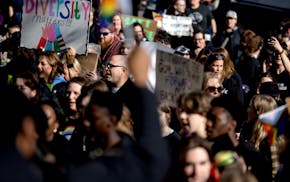The word "equity," once mostly confined to the financial sector, seems to be everywhere in public policy and political discourse these days.
For instance: The Minnesota Minority Education Partnership recently renamed itself the Minnesota Education Equity Partnership.
New efforts at the Minnesota Legislature this year to guarantee paid family leave and provide livable wages often are expressed in the context of both gender equity and racial equity.
The national Bipartisan Policy Center has promoted an Agenda for Generational Equity that addresses questions of generational fairness, fiscal responsibility, economic mobility and opportunity for young people.
Meanwhile, in the world of nonprofits and philanthropies, mission statements and new initiatives increasingly use the word as the favored shorthand for longstanding goals to reduce racial disparities and poverty, and to help those with disadvantages and disabilities improve their lives.
Any suddenly popular word tends to invite pushback from language purists and curmudgeons alike. A certain grumpiness around the word itself could be heard in the criticism of Minneapolis Mayor Betsy Hodges's bold elevation of racial equity as a top priority of her administration since taking office a year ago.
News stories about that goal included quotes from City Council members and commentators scoffing at the word as if it were some meaningless new jargon. Meanwhile, some on the far right dismiss "equity" as a new spin on liberal dreams of perfect "equality," or redistribution, or affirmative action, or even socialism. At the very least, it must be code for higher taxes.
In fact, "equity" is a more broadly appealing word than its close kin "equality," in part because of its place in the language of business and home ownership. The top listed links on Internet searches for "equity" still are for websites owned by banks and financial institutions. Particularly popular are links to "private equity" investments, increasingly sought after by those at the top seeking ever higher returns, which is ironically generating the demand for a little more equity for those not so advantaged.
And to many struggling middle-class homeowners, equity is a very happy word because it is used to describe that portion of their home's value that is not owed on the mortgage.
It is this connotation — that equity is really about every person or household having a reasonable share of property and assets, an ownership stake in society and the economy — that makes it the ideal word for describing all our various efforts to reduce inequality and invest in human capital.
This equity idea has roots in traditional conservatism and in economic policies such as the Homestead Act of the 19th century, a hallowed American achievement in which gigantic tracts of real estate were given away in roughly equal portions to thousands of immigrants and others of limited means. Settlers only had to "improve" the land in order to keep it. (Racial equity being an idea of the distant future, American Indians had in many cases been unfairly forced off that land, and people of color were effectively excluded from this equity program).
Equity also is arguably related to the century-old idea of "distributism," a concept advanced by English author G.K. Chesterton, who remains a favorite original thinker for many conservatives, and who is sometimes cited in Catholic social teaching. (Wikipedia's latest entry on distributism suggests that Pope Francis is resurrecting the concept with his critiques of the current direction of global capitalism and "an economy of exclusion and inequality.")
Chesterton, as a critic of both laissez-faire capitalism and Marxism, said all kinds of droll and brilliant things about greedy capitalists and extreme redistributionists. Here's just one about the former: "All but the hard hearted man must be torn with pity for this pathetic dilemma of the rich man, who has to keep the poor man just stout enough to do the work and just thin enough to have to do it."
Chesterton idealized a middle course in which some level of significant property ownership — "three acres and a cow" was a favorite slogan — ought to be a fundamental right, with assets spread as widely as possible. It was, he said, an alternative to a false choice between winner-take-all capitalism and dehumanizing Marxist equality imposed by state ownership of all property.
"Property is merely the art of the democracy," Chesterton said, adding with his typical respect for traditional religion: "[I]t means that every man should have something that he can shape in his own image, as he is shaped in the image of heaven."
The point of all this etymology and semantic history is that there is a solid foundation for some agreement between conservatives and liberals, between Republicans and Democrats, around the idea of equity and universal assets.
It's most encouraging to see in recent years that business and corporate leaders, especially in Minnesota, are also using the word equity and warning that a simultaneous combination of increasing diversity and increasing disparity spells big trouble for long-term business health and competitiveness.
Nationally, the W.K. Kellogg Foundation is just one of many organizations to seize on this theme with a 2013 report titled "The Business Case for Racial Equity." Minnesota's ongoing Itasca Project, composed of some of the state's most prominent corporate leaders, has maintained a steady course of helpful policy guidance around the theme of equity and reducing disparities.
Perhaps the best and most complete exposition of equity as an overarching philosophy, with a menu of specific policy imperatives for state and federal policymakers, can be found at the national think tank PolicyLink, based in Oakland, Calif. The organization's mantra is that "equity is the superior growth model." Its website is rich with data and policy prescriptions for racial equity as a business proposition, including a Minnesota-specific analysis called "Minnesota's Tomorrow."
Minnesota might already be a leading state in the equity movement, particularly in regard to our disturbing racial disparities, with efforts including mayoral initiatives in both Minneapolis and St. Paul; "Everybody In," a Twin Cities-wide collaboration of government, business and education leaders aiming to end workforce disparities; MSPWin, a new philanthropic funder's collaborative focused on workforce alignment and racial equity; an ongoing coalition for a Women's Economic Security Agenda, and a strong chapter of Black Lives Matter, a grass-roots organization focused on ending discriminatory practices in policing and law enforcement.
These movements illustrate that at least three kinds of equity policy present themselves front-and-center in Minnesota, for a new wave of distributism.
• Educational attainment: Land grants and family cows are probably a thing of the past. In the 21st century, the indispensable asset for long-term individual prosperity and equity will be postsecondary credentials. It's an asset that keeps on giving and can't be taken away. We know how crucially important high-quality early childhood development is toward that goal, and Minnesota finally is on its way toward large investments in educational equity, from prenatal care to low-cost guarantees of postsecondary access and completion.
• Better pay and benefits: It will remain difficult for ordinary folks to amass assets and property, or for the struggling middle class to recover, if our economic system continues to devalue their work and if pay and benefits continue to erode, as they have since the 1970s, for households at or below median income. Policies that accelerate recent progress toward a livable wage, that guarantee low-cost health care coverage, and that move folks toward self-sufficiency and home ownership, should be reinforced and redoubled.
• Antidiscrimination policy: High-profile campaigns such as those led by Voices for Racial Justice and Restore the Vote, along with a host of other efforts to change policies that unfairly punish the poor and communities of color, are no doubt causing discomfort for some white Minnesotans. But these reforms are overdue and salutary. Our nation's worst feature, and a primary cause of its inequality, is its long and wretched history of slavery, oppression, segregation, discrimination and indifference.
And if we're looking for inspiration on the equity theme, we can look to the young people of color organizing for justice today, or to the old, dead white men who advanced the cause of equity against fierce opposition in their own time. Here's a gem from the 18th-century statesman Edmund Burke, a member of the English Parliament who sympathized with the American Revolution and its egalitarian ideals.
"There is but one law for all, namely that law which governs all law, the law of our Creator, the law of humanity, justice, equity — the law of nature and of nations."
Dane Smith is the president of Growth & Justice, a public-policy organization that seeks to reduce economic and racial inequality in Minnesota.
Readers Write: Presidential immunity, Sen. Nicole Mitchell
![O'Shaughnessy Stadium was photographed at the University of St. Thomas' St. Paul campus on Friday, Nov. 6, 2020. ] AARON LAVINSKY • aaron.lavinsky@s](https://arc.stimg.co/startribunemedia/4T767TPWMLRIJRHF67U45OBYDM.jpg?h=91&w=145&fit=crop&bg=999&crop=faces)
Editorial counterpoint: St. Thomas does work with its neighbors
Troubling talk on campus protests

Counterpoint: Anoka-Hennepin's DEI policies actually do warrant a debate

